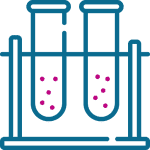The lactate dehydrogenase (LDH) test is primarily used as a general indicator of the fact and severity of acute or chronic tissue damage. It is also used to assess the course of certain chronic diseases such as cancer, kidney and liver disease. In the past, LDH was used to diagnose and monitor the course of myocardial infarction. The troponin test is now used for this purpose. The detection of different forms of LDH by LDH electrophoresis allows the location of the lesion to be distinguished.
When should I be tested?
If your doctor suspects an acute or chronic disease that damages tissues or cells, together with other tests, he or she can identify the site of the lesion (which organ is affected) and assess the course of the disease.
The lactate dehydrogenase (LDH) test can be used to monitor damage caused by muscle damage, and to assess haemolytic anaemia, which is caused by red blood cells (erythrocytes) that are over-sensitive or mechanically damaged.
What sample is needed for the test?
Blood is drawn from a vein in the arm.
How to prepare for the survey?
No need.
What do my results mean?
Increased lactate dehydrogenase (LDH) enzyme activity indicates tissue damage. LDH activity is elevated in many different diseases because LDH is present in many tissues. Increases in the following cases:
1. brain stroke;
2. use of alcohol and/or drugs (anaesthetics, aspirin, procainamide, narcotics) and/or narcotics;
3. haemolytic anaemia;
4. megaloblastic anaemia;
5. infectious mononucleosis;
6. intestinal infarction, pulmonary embolism, tissue death;
7. kidney disease;
8. liver disease;
9. muscle diseases;
10. pancreatitis
11. testicular cancer, lymphomas and some other cancers.
Slightly elevated LDH levels may persist in some chronic and progressive diseases and with certain medications.
Low or normal LDH activity is usually not a problem. This may occur in some people taking high doses of vitamin C.
Related studies
Troponin I or troponin T, creatine kinase (CK), CK-MB, ALT, AST, alkaline phosphatase
Related conditions/diseases.
Anaemias, infectious mononucleosis, liver disease, kidney disease, muscular dystrophy, pancreatitis, intestinal infarction, pulmonary embolism, stroke.
You can consult our family doctors.

